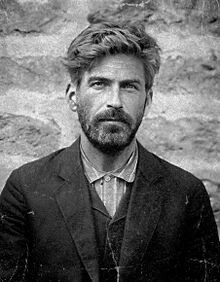Fehrer Farkas: Difference between revisions
No edit summary |
No edit summary |
||
| (4 intermediate revisions by one other user not shown) | |||
| Line 4: | Line 4: | ||
| name = Fehrer Farkas | | name = Fehrer Farkas | ||
| honorific-suffix = | | honorific-suffix = | ||
| image = | | image = FaceApp Farkas.jpg | ||
| image_size = 220px | | image_size = 220px | ||
| office = [[Drevstran|Leader of the Farkas Band]] | | office = [[Drevstran|Leader of the Farkas Band]] | ||
| Line 72: | Line 72: | ||
'''Fehrer Farkas''', also known by his callsign of '''White Wolf''', was a [[Drevstran|Drevstranese]] conscript of the [[Drevstran|Triple Crown Army]] turned deserter after the [[Drevstranese Civil War|Bolsarist Coup]], then bandit and finally leader of a socialist-leaning small army known as the '''Farkas Band'''. This troop was an eclectic mix of rebels, bandits, deserters, and socialists revolutionaries that found refuge in the western regions of [[Drevstran]], between the Furodommark Highlands and the Mren River. Fehrer Farkas quickly came to conflict with [[Vilvo Orbraggar]], a General-turned-Warlord who was operating in the Furodommark and was opposed to Farkas' exactions and encroaching presence. | '''Fehrer Farkas''', also known by his callsign of '''White Wolf''', was a [[Drevstran|Drevstranese]] conscript of the [[Drevstran|Triple Crown Army]] turned deserter after the [[Drevstranese Civil War|Bolsarist Coup]], then bandit and finally leader of a socialist-leaning small army known as the '''Farkas Band'''. This troop was an eclectic mix of rebels, bandits, deserters, and socialists revolutionaries that found refuge in the western regions of [[Drevstran]], between the Furodommark Highlands and the Mren River. Fehrer Farkas quickly came to conflict with [[Vilvo Orbraggar]], a General-turned-Warlord who was operating in the Furodommark and was opposed to Farkas' exactions and encroaching presence. | ||
The Orbraggar-Farkas conflict took a turn for the | The Orbraggar-Farkas conflict took a turn for the bloody when both received [[Ostrozavan]] support from the United Republican and Socialist Parties, with the Socialists preferring Farkas and the Republicans preferring Orbraggar. This inability to coordinate on the question of the [[Drevstranese Civil War]] is an often cited cause of the events that led to the [[Second Worker's Convention]] and the subsequent rise of {{wp|authoritarian socialism|ordosocialism}} on the other side of Lake Kupalnitsa. Empowered nonetheless, Farkas was able to strengthen his control over the northern Furodommark and the Mren River Valley, threatening urban centers such as [[Alban Pentapolis|Barbellon]]. But ultimately, the Orbraggist military structure, organisation ,and superior logistics were decisive, leading to the destruction of most of Farkas's bastions and the defeat of his remaining forces at the [[Battle of Ryprudy]]. Farkas himself would die in unknown circumstances during the aftermath of the battle, sealing the fate of what was left of his army, which broke down and dispersed in a number of smaller bands, mostly consisting of bandits. Farkas's defeat would ultimately leave [[Vilvo Orbraggar]] as the only remaining credible warlord in Western Drevstran. | ||
[[category:Drevstran]] | |||
Latest revision as of 13:00, 27 November 2023
Fehrer Farkas | |
|---|---|
 | |
| Leader of the Farkas Band | |
| In office 1913–1915 | |
| Preceded by | None |
| Succeeded by | None |
| Personal details | |
| Political party | Farkas Band |
| Profession | Farmer and Soldier |
Fehrer Farkas, also known by his callsign of White Wolf, was a Drevstranese conscript of the Triple Crown Army turned deserter after the Bolsarist Coup, then bandit and finally leader of a socialist-leaning small army known as the Farkas Band. This troop was an eclectic mix of rebels, bandits, deserters, and socialists revolutionaries that found refuge in the western regions of Drevstran, between the Furodommark Highlands and the Mren River. Fehrer Farkas quickly came to conflict with Vilvo Orbraggar, a General-turned-Warlord who was operating in the Furodommark and was opposed to Farkas' exactions and encroaching presence.
The Orbraggar-Farkas conflict took a turn for the bloody when both received Ostrozavan support from the United Republican and Socialist Parties, with the Socialists preferring Farkas and the Republicans preferring Orbraggar. This inability to coordinate on the question of the Drevstranese Civil War is an often cited cause of the events that led to the Second Worker's Convention and the subsequent rise of ordosocialism on the other side of Lake Kupalnitsa. Empowered nonetheless, Farkas was able to strengthen his control over the northern Furodommark and the Mren River Valley, threatening urban centers such as Barbellon. But ultimately, the Orbraggist military structure, organisation ,and superior logistics were decisive, leading to the destruction of most of Farkas's bastions and the defeat of his remaining forces at the Battle of Ryprudy. Farkas himself would die in unknown circumstances during the aftermath of the battle, sealing the fate of what was left of his army, which broke down and dispersed in a number of smaller bands, mostly consisting of bandits. Farkas's defeat would ultimately leave Vilvo Orbraggar as the only remaining credible warlord in Western Drevstran.